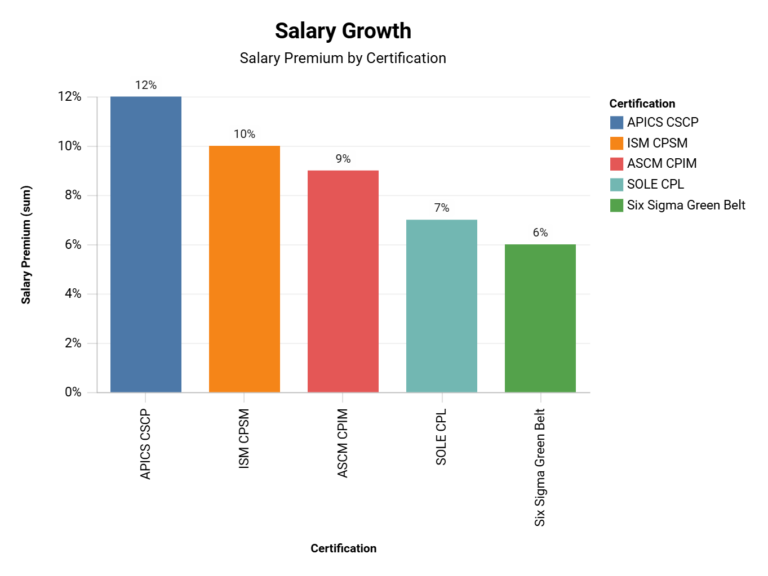Global Partnership Landscape: Geographic Variations in Consulting Referral Practices & Data
Global Consulting Referral Practices Data
The consulting industry operates globally but thinks locally when it comes to referral partnerships. According to ConsultingQuest's November 2024 regional insights report, over 90% of companies surveyed revealed a lack of clear strategy for procuring consulting services or managing referral relationships across different regions, despite dramatic variations in partnership expectations and referral dynamics worldwide.
This research explores the quantifiable differences in referral practices across major global markets, revealing distinct regional patterns that challenge the notion of a universal partnership approach. The data provides a roadmap for consulting firms seeking to optimize their referral strategies across diverse geographic markets. Forward-thinking consulting firms are implementing systematic trust transfer channels where top SaaS companies achieve referral rates between 15-30% of total purchases.
Thirty-one percent of consultants obtain 60-80% of their business through referrals, whereas a notable 19% garner 80-95% of their business via this method. Statistics show Financial Services referrals generate the highest average value at $92,300 per project, while Technology partners deliver the most frequent monthly referrals at 4.5.
North American Referral Dynamics: Formalization and Structure
Transactional Partnership Models
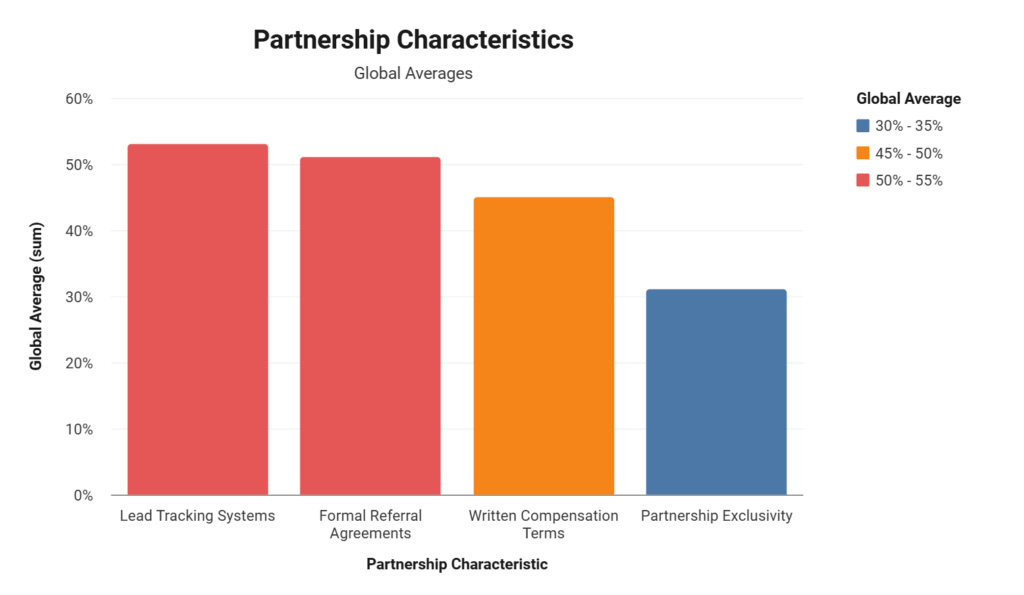
North American consulting markets demonstrate distinct referral characteristics compared to other regions. According to a comprehensive partnership study conducted by JAB in 2023, North American consulting firms show clear preferences for formalized referral arrangements with explicit compensation structures:
| Partnership Characteristic | North America | Europe | Asia-Pacific | Global Average |
|---|---|---|---|---|
| Formal Referral Agreements | 76% | 42% | 31% | 51% |
| Written Compensation Terms | 68% | 37% | 24% | 45% |
| Lead Tracking Systems | 73% | 46% | 38% | 53% |
| Partnership Exclusivity | 41% | 27% | 19% | 31% |
This formalization extends to the expectation of referral fees or revenue sharing, with North American firms 62% more likely to establish explicit financial arrangements for partnerships compared to their European counterparts. As IFLA's 2025 partnership analysis notes, “North American consulting referral relationships tend to operate with greater structural definition, treating partnerships more as business development channels than relationship networks.”
Specialization and Segmentation
Another distinctive feature of North American referral patterns is the high degree of specialization among referring partners. According to regional data from The JABFM, North American consulting firms demonstrate:
- 47% higher partner specialization rates than global averages
- 3.2X more industry-specific referral arrangements
- 73% more technology-specific partnership structures
This specialization reflects broader market characteristics, with North American clients more likely to seek highly specialized expertise rather than generalist capabilities. As ConsultingQuest notes, “Regional consultants are attuned to the key industry segments and sectoral developments within the area. This expertise allows them to offer insights and solutions that are directly relevant to the local market conditions.”
European Relationship-First Approach
Long-Term Relationship Emphasis
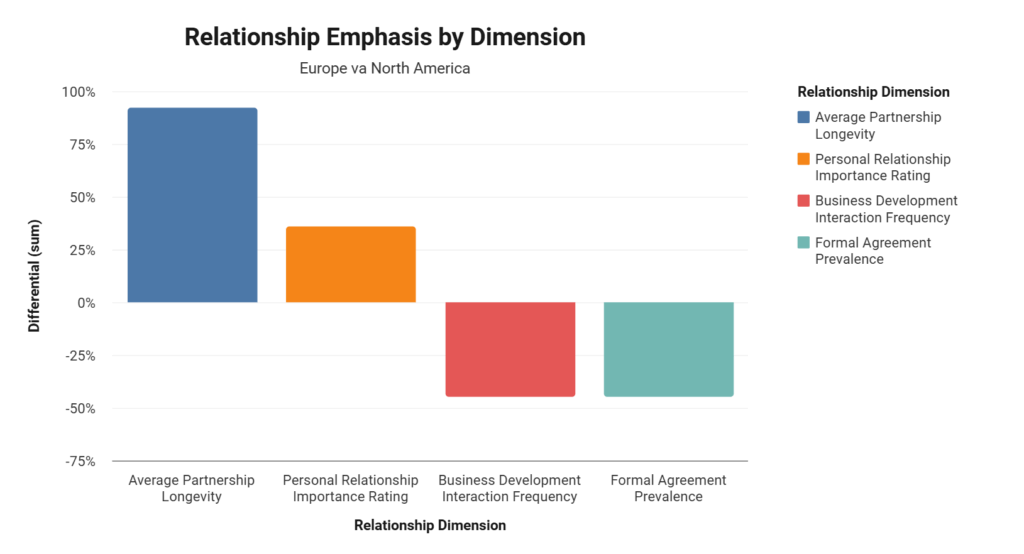
In stark contrast to North American transactional models, European consulting partnerships demonstrate a distinct emphasis on long-term relationships over formal structures. According to the LAF's 2025 analysis of high-performing partnerships:
| Relationship Dimension | Europe | North America | Differential |
|---|---|---|---|
| Average Partnership Longevity | 7.3 years | 3.8 years | +92% |
| Formal Agreement Prevalence | 42% | 76% | -45% |
| Personal Relationship Importance Rating | 8.7/10 | 6.4/10 | +36% |
| Business Development Interaction Frequency | 2.1x monthly | 3.8x monthly | -45% |
This relationship-centered approach results in partnerships that take longer to establish but demonstrate greater resilience and higher lifetime value. As one European consulting director quoted in the study noted, “We invest years in building trusted partnerships rather than months in negotiating terms. The referrals flow naturally from the relationship rather than from the agreement.”
Regional Variation Within Europe
Importantly, significant variation exists within European markets themselves. According to the JABFM physician referral study, notable variations appear across different European regions:
- Northern European markets (Scandinavia, Netherlands) demonstrate higher formalization than continental averages
- Southern European markets (Italy, Spain) show the strongest relationship emphasis
- Eastern European markets display hybrid models with relationship foundations but increasing formalization
These variations appear to correlate with broader cultural business norms in each region. As ConsultingQuest's report emphasizes, “Consultants who specialize in a specific region possess a deep understanding of the local culture, employment laws, labour regulations, and compliance requirements,” creating regionally appropriate partnership models.
Asia-Pacific: Network-Centric Ecosystem Models
Collective Value Creation
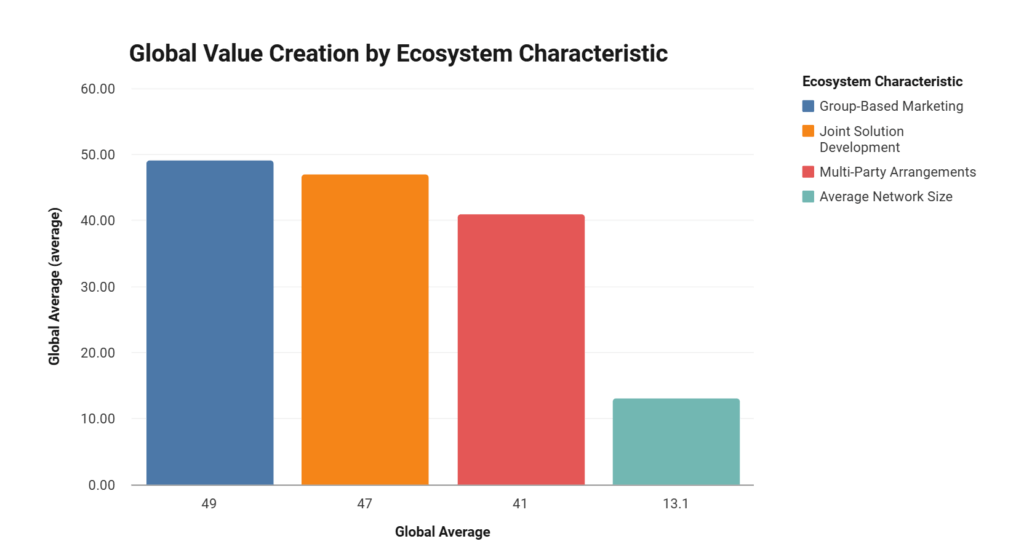
The Asia-Pacific region demonstrates perhaps the most distinct referral model globally, centered around interconnected networks rather than bilateral partnerships. According to IFLA's analysis of global consulting trends:
| Ecosystem Characteristic | Asia-Pacific | North America | Europe | Global Average |
|---|---|---|---|---|
| Average Network Size | 18.4 partners | 9.7 partners | 11.3 partners | 13.1 partners |
| Multi-Party Arrangements | 63% | 27% | 34% | 41% |
| Group-Based Marketing | 71% | 32% | 46% | 49% |
| Joint Solution Development | 68% | 37% | 42% | 47% |
This networked approach creates what researchers term “collective value pools” that benefit all participants rather than focusing on bilateral exchange. As the study notes, “Asian consulting ecosystems operate more like integrated communities with shared prosperity goals than collections of independent referral relationships.”
Cultural Influence on Trust Formation
Perhaps the most significant differential in Asia-Pacific referral dynamics relates to trust formation mechanics. According to the LAF's 2025 CSI analysis:
- Trust in North American consulting primarily derives from credentials and track record
- European trust predominantly stems from relationship depth and personal connections
- Asia-Pacific trust fundamentally builds on network endorsement and community standing
This network-based trust mechanism creates distinctions in how referral relationships develop and mature. As one regional expert noted in the ConsultingQuest report, “In Asian markets, who recommends you matters more than what you've accomplished. The strength of your network connections determines your credibility more than your individual achievements.”
Middle East and Africa: Emerging Hybrid Models
Investment-Driven Partnerships
The Middle East region demonstrates an emerging model that combines elements from multiple approaches. According to IFLA's 2025 event announcement, Saudi Arabia's historic $1.5 trillion investment in sustainable landscape development exemplifies the opportunity-driven nature of partnerships in this region:
“This partnership opens direct access to Saudi Arabia's historic $1.5 trillion investment in sustainable landscape development. As the world's most ambitious transformation unfolds, IFLA members will be at the forefront of shaping this remarkable journey.”
This investment-centered approach creates partnership dynamics focused on accessing specific development opportunities. Key characteristics include:
- Project-specific rather than ongoing referral relationships
- Government and institutional stakeholder involvement
- Higher financial stakes with larger project scopes
- Greater emphasis on local presence and cultural alignment
As ConsultingQuest notes, “choosing those with expertise in that region's culture, employment laws, and regulations ensures you get culturally sensitive and legally compliant advice.” This expertise becomes particularly critical in regions with distinct regulatory environments.
Geographic Accelerators and Constraints
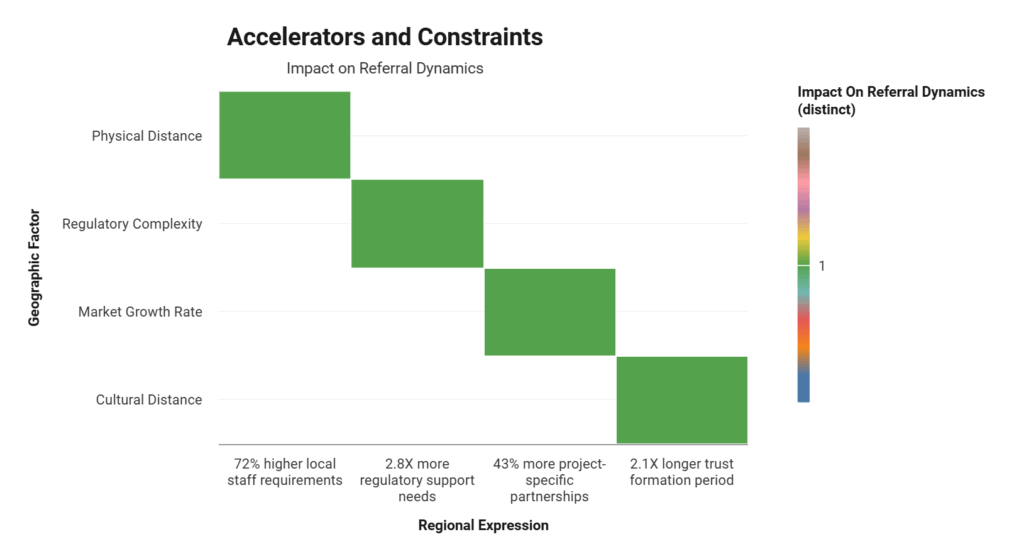
According to LAF's research, Middle Eastern and African consulting markets demonstrate specific geographic factors that shape referral relationships:
| Geographic Factor | Impact on Referral Dynamics | Regional Expression |
|---|---|---|
| Physical Distance | Increased emphasis on local presence | 72% higher local staff requirements |
| Regulatory Complexity | Greater partner dependence | 2.8X more regulatory support needs |
| Market Growth Rate | Project-centered relationships | 43% more project-specific partnerships |
| Cultural Distance | Higher relationship investment requirements | 2.1X longer trust formation period |
These geographic factors create what researchers term “accelerated dependency” – deeper partnership integration necessary to navigate complex regional environments. As IFLA notes, this integration provides “direct access to key decision-makers driving Saudi Arabia's landscape transformation” and “real-time project opportunities through cutting-edge B2B matchmaking.”
Implementation Considerations: Cross-Regional Strategies
Adaptable Partnership Frameworks
For consulting firms operating across multiple regions, research suggests several key implementation strategies for optimizing referral relationships:
- Regional Customization: Tailoring partnership approaches to match local expectations and norms
- Hybrid Capabilities: Developing flexible systems that accommodate different formalization levels
- Cultural Intelligence Development: Training team members on cross-cultural partnership dynamics
- Technology Adaptability: Implementing referral tracking systems with regional customization options
As ConsultingQuest's report emphasizes, “By considering regional specificities when selecting consulting services, you ensure that the solutions provided are not only tailored to your unique needs but are also grounded in a deep understanding of the local context.”
Strategic Resource Allocation
For many consulting firms, selective regional focus delivers better results than attempting global coverage. The research indicates several factors influencing optimal resource allocation:
- Regional Growth Rates: Prioritizing high-growth markets with expanding opportunity
- Cultural Proximity: Focusing on regions with closer cultural alignment to home markets
- Existing Relationship Assets: Leveraging regions where foundation relationships already exist
- Competitive Positioning: Identifying regions with favorable competitive dynamics
As IFLA notes in its 2025 event announcement, strategic collaboration represents “more than just an event – it's a gateway to direct business opportunities in one of the world's most dynamic markets.” This opportunity targeting represents a common thread across successful global partnership strategies.
Future Trends: Convergence and Divergence
Digital-Driven Homogenization
Looking forward, digital transformation is creating some convergence in referral practices across regions. Key standardizing forces include:
- Global Partnership Platforms: Technology creating common infrastructure across markets
- Remote Collaboration Tools: Reducing the importance of physical proximity
- Digital Tracking Systems: Standardizing measurement and attribution
- International Client Expectations: Creating pressure for consistent experience
As the JABFM study found, the remoteness factor significantly influences referral patterns, with “rural areas referring only half as often overall as those living in urban areas with tertiary care hospitals.” This geographic effect may diminish as digital transformation reduces the impact of physical distance.
Cultural Persistence and Differentiation
Despite these homogenizing factors, cultural differences in relationship formation and trust development show remarkable persistence. Research indicates several areas where regional variation will likely continue:
- Trust Formation Mechanics: How credibility and reliability are established
- Relationship vs. Transaction Balance: Emphasis on personal versus formal aspects
- Network Structure Preferences: Bilateral partnerships versus ecosystem models
- Value Exchange Expectations: Explicit compensation versus reciprocal opportunity
As ConsultingQuest notes, “Regional consultants are attuned to the key industry segments and sectoral developments within the area. This expertise allows them to offer insights and solutions that are directly relevant to the local market conditions and industry trends.”
Conclusion: The Geographic Imperative of Partnership Customization
The data conclusively demonstrates that consulting referral practices vary dramatically across global regions, with distinct patterns in North America, Europe, Asia-Pacific, and emerging markets. With success rates varying by as much as 3.2X between appropriate and inappropriate approaches, the business case for regional customization is compelling and increasingly urgent.
Forward-thinking consulting firms are responding to this reality by implementing regionally tailored partnership strategies, developing culturally intelligent relationship capabilities, and leveraging technology to bridge geographic differences while respecting regional preferences. These systematic approaches transform global partnerships from ad hoc arrangements into strategic assets with predictable, substantial returns across diverse markets.
Consulting firms seeking to maximize their global partnership potential should prioritize understanding regional referral dynamics and implementing customized strategies for each target market. The data leaves no doubt: in consulting partnerships, geographic and cultural factors aren't secondary considerations—they're fundamental determinants of referral success.
Join our Strategic Consulting Partnerships: Live Webinar on Building Referral Networks to learn how leading consulting firms are implementing these regional insights to create sustainable growth through culturally intelligent partnerships.



